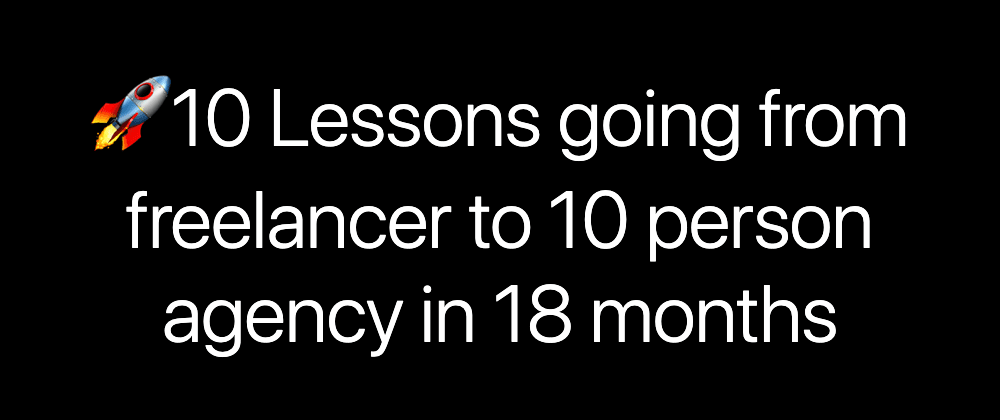After a 2 week break, I'm back again. Thank you to the 2,000 people who followed me, I'm deeply honoured and I hope to not let you down.
I'll try walking you through one part of my last 2 years, 1 year was on a startup(more about that later) but let's go into the 10 lessons I learnt building my company into 10 staff and working on massive projects at five2one.com.au
Let's jump right into it:
1. You're going to monumentally screw up
I get shudders just looking back at when I started, I thought the influence of all these "influencers" was the right way to go, you know, hire someone and then "automate" - no, screw that, you need to be there for the first few months and process everything, to the T and then automate.
Embrace the suck and understand that everyone goes through this, just be on top of your toes whenever mistakes happen and don't make decisions on emotion. Most client-agency relationships are like marriages, and you need to iron out the kinks but more importantly set expectations from the beginning.
2. You'll struggle to be the best dev
I'll be the first to admit it, I drive some of my identity programming, but the hard lesson is you'll need to learn to let go and get extremely vulnerable. Don't worry, it's an excellent feeling. Because if you pull it off right, you'll start learning from your team and the knowledge flow won't be one way, but circular.
I now strive to be the dumbest in the room, because that means I'm punching above my weight and there's only upwards to go!
3. They don't know what you know
People often assume that the knowledge you possess you clients' possess, and most times they don't - that's why they're hiring you.
This will be one of the pivotal places that will define your success, whenever I find a client who doesn't know much and asks questions, I don't get frustrated, because I'm helping build this clients dream as well as educating and training them. You get the Life Time Value built from here.
This has worked every single time, the clients absolutely love it, and it's reflected in every testimonial we've ever gotten - you can check them out at https://www.five2one.com.au/#testimonials, I wasn't lying - become an educator!
4. Go on a vacation
So I pre-booked a holiday before I started the firm (a year in advance, don't ask haha) turns out it ended up being one of my best decisions. When you force yourself out of the scenes, you suddenly need to make sure everything works without you being there.
This is scary as hell, I mean, I was there for EVERYTHING in the business, but now all of a sudden I had to make "processes" to pull myself out of the business, and turns out those processes worked like a charm. And at this point I'll happily plug one of the BEST books I've read as a business owner "Built to sell" - you need to build your business as a machine that is so automatic, it can operate without you, and that is the true mark or scale of a successful "Agency" - NOT business, but Agency.
Because you see, you start the agency with you being the "trust" factor, but soon enough you become a Gordon Ramsay, you need to tell you, clients, you're a brand but you won't be cooking the meals - it makes no sense.
5. Sell products not services
Wait what, no, I'm an "agency", not a SaaS business. I know, I thought the same, but when I look at all the big mofos, you know what I realised? They all sell products, they don't sell services.
Because when you sell products, you get to create a repeatable and predictable system. When you sell bespoke solutions, you end up offering a new world every.single.time, and that can get very tiresome, so when I started offering products things changed...
Things like "AI solutions for analytics" or "ICOs and Smart Contract Development for Logistics".
When I started doing that, two things happened, I lost a few potential clients but gained A LOT of new clients specific to the industry I was selling products on, and it became really easy for me to stand out and create a strong brand.
I wish I did this earlier
6. Sell results, not Execution
Build your agency like a product, you need to know your USPs, Customer Persona's, what pain points you're trying to solve, what makes you better.
I didn't do any of that, I just went in based on my LinkedIn and a brand or two I had on my profile. Understandably it was very hard for me to get clients for a little bit, which changed of course.
So the first part to this point is, I used to sell tech and really cool tech practices, which work PERFECTLY when I was trying to reach out to a CTO, who doesn't code. This is important to understand if the CTO knows how to code, then they will be a much harder sell unless you build a brand (which we kind of got to do, after a year or so). A CTO who hasn't been on the tools for a while would be great to sell the latest services to, which does mean you need to be on top of your tech - i.e latest and greatest tools
The second part to this point is, considering you've worked out your persona you need to learn how to sell results. You're selling your audience piece of mind.
Your messaging should be such that, if they use you, they can do better at their job, you're their enabler
If your speciality is the execution though, they definitely sell that - nothing in this article is set in stone.
7. Delegate and accept
Yes, this is 101, however, I struggled incredibly hard with this. Because every time I delegated I knew I could do the same task faster, if not better. However, I learnt to get off my high horse and attract the right people to delegate to, the right people will LOVE the responsibility own it and actually give you tasks to do.
Yes, the risk is that the work sometimes might be 80% of what it would be if you did it, but you only have so many hands and hours in a day, learn to live with it with a mindset to continuously improve that metric.
8. They don't care about algorithms
Yeah, it was the hardest thing I had to accept. As someone who goes to bed with a smile when they optimise something or think of a cool technical piece, it was very hard to not have money paying clients to see the same level of appreciation for elegant code as me.
For the longest time, my mantra for good engineering was similar to good UX, it's meant to go unseen to the naked eye.
If it's good, it's not meant to exist to the average user. So I learnt to ALSO sell the absence of headaches not only the presence of time and money saving.
9. They will push you to breaking point
The cheapest clients drain the most energy and the highest paying clients are the easiest to work with.
So be careful, try to find a FEW high paying clients than many low paying clients, if they don't pay much its because money is very very dear to them, and they'll be more protective and less flexible with anything, so learn to respect that or just don't go after those people.
And remember where the chain of command lies, you need to have the authority and position to walk away, you'll garner ALOT more respect.
NEVER come off as a yes-man/woman
10. Never Discount Prices
There are a million articles about increasing prices and blah - so not repeating that here. However, unlike a physical good that has a tangible cost, your hourly rate is "made" up, sure it's more tangible when you hire staff but it's still "made" up, you can charge $300 p/h and someone else can change half that.
So you need to be very careful about your positioning with price, if you discount yourself $10, the client will think about asking you to lower more, after all its just you vs you right?
SO never reduce your hourly, instead, lower the scope of the project - you'll find out two things this way, if the client wants to work with YOU and if they respect you enough to pay your rate.
That being said not everything is binary if you get to work with your dream company or project, you need to learn to take the hit and do it for the opportunity, we do that at five2one.com.au as well.
As with any post, I'm always always looking to learn and become better at what I do, so I'd love to hear what you have to say, good or bad 🙌
If you liked this, definitely follow me on for the similar stuff:
twitter: twitter.com/@veebuv
linkedin: linkedin.com/in/vaibhavnamburi
instagram:_veebuv







Top comments (8)
Whew you got me with the grammar part, I realised i set "publish" to true before proofing it. So my bad there - no point taking this offline.
Can vouch that it does get dry when you continuously build for others, but some/many people drive energy from solving problems "the whole consulting world".
Surprising you'd say the agency devs are in it for money, considering most agencies tend to not pay market price for engineers, nonetheless you have a very valid point RE product engineers vs agency engineers. I learnt the difference in a hard way, but ideally if you get a team that understands the business model and you build transparency around it, its possible to scale. (Annoying part of any agency is that scale == headcount)
On the money with the Technical Documentation bit! 🚀
Pricing is always a tricky one, we've done fixed scope and kept comms restricted as well as done TnM, both worked well for us, and didn't at the same time. You just need to get good at understanding the audience and stepping away from a potential project if you know the client is going to be a brain drain.
Also much like Ady's comment, it would be great hearing from other agency owners on their thoughts on running their business.
We focused on only senior hires and I paid them well for remoting based on Canada standards.
I did not notice grammar issues. Paid Grammarly would have suggested improving your writing style. It's not my interest to call you out it (grammar or poor writing otherwise). You asked for feedback at the end of the article so I delivered.
And the feedback is always appreciated 😉 Gotta have that tight loop of feedback / execution
I would really love to have you extrapolate this into its own stand-alone article. It’s too good to live in the comments. I’m a full time consultant with an opportunity to scale to an agency. I really would like to hear more 😀
DEV.to is working on improving the accounts so comments can be promoted. I do have a habit of writing mini-articles in others.
Currently, I need to fulfill my promise to make some video recording of LinkedIn feedbacks and once that's done maybe I can draft a full article.
I don't mind sharing since I no longer consult, freelance or run a web-dev firm so its time to give all my secrets away for others.
this reply had more substance than the article
you're far too kind 😂